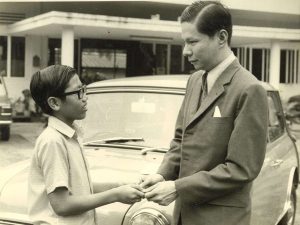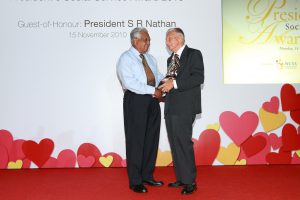Turning disability into gold
Losing one’s sight would have fell the most staunchest of men. But for one man, he used that setback to become a champion for the visually-handicapped.
BY: Tan Boon Leng
 When the light of sight went out in 1968, the then 29-year-old, ex-Raffles Institution student Tan Guan Heng could have fallen into the abyss of depression and plumbed the unfathomable darkness of a future that could have promised much, but was cruelly extinguished. Fortunately, he was made of sterner stuff.
When the light of sight went out in 1968, the then 29-year-old, ex-Raffles Institution student Tan Guan Heng could have fallen into the abyss of depression and plumbed the unfathomable darkness of a future that could have promised much, but was cruelly extinguished. Fortunately, he was made of sterner stuff.
Clocking up more than 40 years of selfless service to the community, Tan served two stints as the president of the Singapore Association for the Visually Handicapped (SAVH) – from 1975 to 1980, and then from 2006 to now. From 1988 to 2000, he was also a member of the resource panel on the Government Parliamentary Committee for Community Development.
He was deservedly conferred the highest national award for volunteerism in 2010, the President’s Social Service Award (PSSA). Agelessonline chats with this indefatigable community hero:
 You turned blind at 29 because of a detached retina in each eye. What were you doing then?
You turned blind at 29 because of a detached retina in each eye. What were you doing then?
I was working with a publishing firm promoting educational books to universities, colleges and the National Library when I became blind. I had to resign because of my blindness.
In an interview with the National Council of Social Service (NCSS) magazine, “Rapport”, you said you experienced a lot of bitterness and frustration when you turned blind. Can you tell us what was the turning point that helped you look forward to make the best of your disability?
I told myself not to wallow in self-pity and burden my family and friends. I started my own book business because I could not find employment in the open market and also because I love reading and writing. That’s when I became an author.
What are some of the achievements you are most proud of helming the SAVH?
Two projects make me very proud. One is the Low Vision Clinic which I set up that helps the visually-handicapped optimise the use of their remaining vision. The clinic also helps in the early detection and treatment of eye diseases in preventing the onset of blindness. Another is the establishment of the SAVH library despite the initial scepticism from the SAVH Committee. Today, the library is well-stocked with a big collection of books of different genres in Braille and even audio books.
You have authored three books – “My Love is Blind”, “Night Butterfly” and “100 Inspiring Rafflesians, 1823-2003”. Can you share with us your experience and challenges as a visually-handicapped person writing these books?
The difficulty was to ‘write’ them using Braille language and to do the necessary research. I also had to tap on my memories as each book chronicled a different stage of my life. Each book took me about two years to write.
Is there another book in the pipeline?
I am planning a fourth book 100 Inspiring Disabled, profiling 100 disabled people who have overcome their disabilities and succeeded in study, sports and their careers. I am currently in the process of researching and the book would only be ready in another year or so.
What kind of genre do you like to write about?
I like to write love stories! Although the market (for books) in Singapore is small, I believe there is a demand for such books.
How do you think the visually-handicapped can contribute to the nation?
I knew of visually-handicapped persons who are teachers – two of them have PHDs. There are also visually-handicapped people who are musicians performing in functions and events.
What are some of the existing challenges visually-handicapped people still face in the community?
Public perception borne out of ignorance and prejudice is still a main challenge to the visually-handicapped in the community because they are perceived as ‘unable’ and not given a chance at being gainfully employed to show they can support their family or contribute to the community.
SAVH focuses on public education to raise awareness of the visually-handicapped to show they are independent, help them find gainful employment and integrate into society.
Are you involved with other voluntary welfare organisations?
My role as president of SAVH takes up a lot of my time. I am at the SAVH office two to three times a week for meetings and functions. I also give talks and am invited as a panel speaker at seminars. So my time is pretty tight.
Having been in social service for more than 40 years, what keeps you going?
At Raffles Institution, we were educated in the ideas and ideals of “service to others”. Even when I became blind, I still felt that I could be of service to the community especially the blind people. This keeps me going.
 Besides your love for the literary word, what other interests keep you occupied?
Besides your love for the literary word, what other interests keep you occupied?
I swim one hour daily, listen to audio books and radio, and meet up frequently with my three groups of friends – from the publishing sector, my old Rafflesian classmates and fellow volunteers in social service.
How did you feel about receiving the PSSA 2010 Individual Category Award (right)?
This is the highest award given to volunteers in Singapore. It is an honour and privilege for me to receive this award for my service to the community and blind people. This is also an endorsement of the work of SAVH as the national voluntary welfare organisation for visually-handicapped people.
Finally, when do you plan to slow down, call it a day and enjoy your retirement?
I plan to slow down in the next one or two years and pass on the baton to someone who is willing to lead the SAVH. Until that person is found, as long as I am strong and able, I will go on.

0 Comments